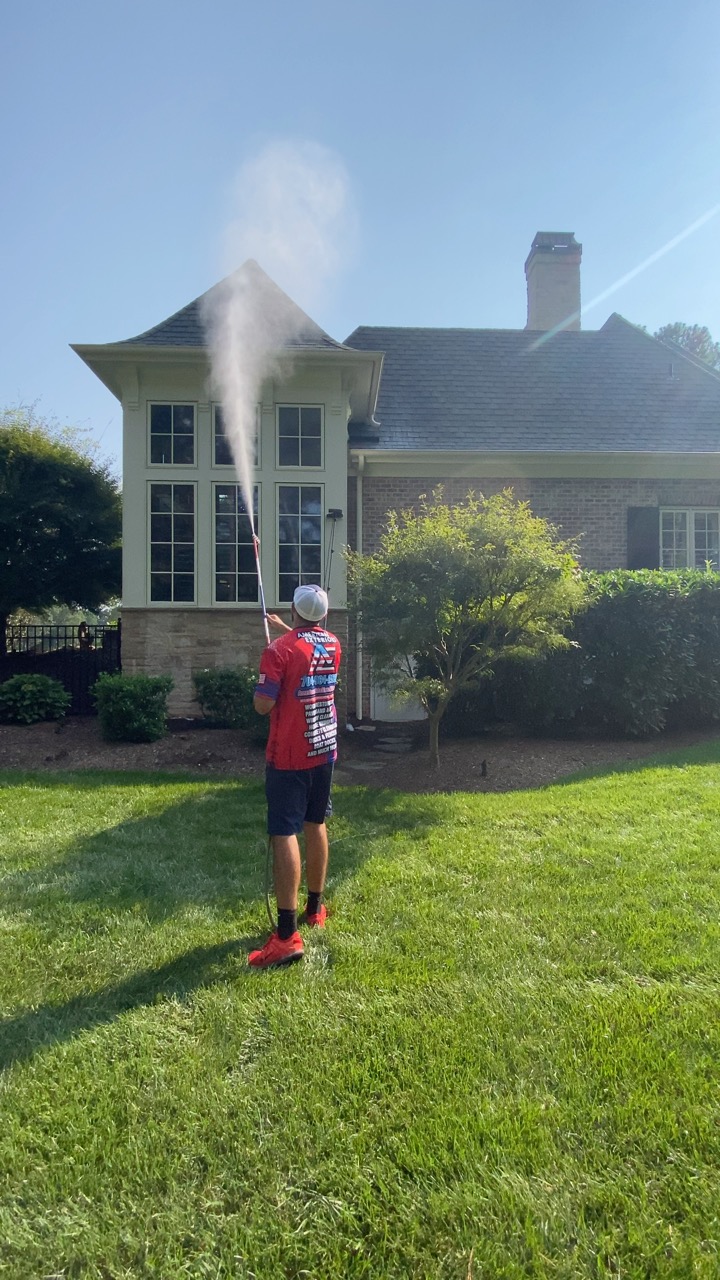Local. Family Owned. Trusted.
Professional exterior cleaning services
Our Services How Can We Help You?
At American Exteriors, we pride ourselves on delivering top-tier property services with a relentless commitment to professionalism, innovation, and cutting-edge technology. We’re not just another cleaning company but your partners in enhancing your home or business’s beauty, longevity, and cleanliness. Download our service packet here to access detailed information about our offerings.
Window Cleaning
When it comes to window cleaning, we don't just wipe away smudges and streaks; we provide a thorough and professional service that leaves your windows sparkling. Our attention to detail ensures that your home's natural light is maximized, offering a clearer, brighter, and more inviting atmosphere within your living spaces.
House Washing
Our comprehensive house washing service goes beyond surface cleanliness; it's a meticulous process that removes built-up dirt, grime, and even mold from your home's exterior. We take pride in restoring your house's natural beauty and protecting it from the effects of environmental wear and tear.
Pressure Washing
We specialize in rejuvenating various surfaces, such as decks, fences, driveways, patios, boat docks, and piers, with our expert pressure washing services, ensuring not only a clean appearance but also the preservation of the integrity and longevity of these structures.
Gutter Cleaning
Preventing property damage is our priority, and our efficient gutter cleaning solutions play a crucial role in achieving this. We meticulously remove leaves, branches, and dirt buildup from your roof's gutters, safeguarding your home from potential water-related issues.
Roof Washing/Cleaning
Revitalize your roof with American Exteriors Lake Norman's expert cleaning services. Our tailored approaches, including soft wash, pressure washing, and chemical cleaning, cater to various roof types.With over 5 years of experience and a commitment to 100% satisfaction.
Paver Cleaning and Sealing
Elevate both the aesthetics and structural integrity of your building with our professional paver cleaning and sealing services. Our meticulous approach not only enhances the appearance of your pavers but also contributes to the long-term durability of your property.
Commercial Services
Our expertise in exterior maintenance extends beyond just homes; it also encompasses commercial properties, including offices, homeowner associations (HOAs), restaurants, storefronts, apartment complexes, nursing homes, hotels, and motels. We take pride in enhancing the exterior appeal of diverse businesses.
Holiday Lighting
Infuse a touch of festive charm into your property with our holiday lighting services. We go the extra mile to create personalized lighting displays that not only beautify your home but also spread the joy and spirit of the season throughout your surroundings.


Our Mission: Elevating Your Property's Beauty and Value
American Exteriors Lake Norman has you covered
At the heart of our mission is a commitment to not only meet but surpass your property service needs. We understand that your property is not just a physical asset, but a place that holds countless memories and aspirations. Whether it’s a residential or commercial property, our team is driven by the belief that a well-maintained exterior not only enhances the aesthetics but also plays a crucial role in safeguarding your investment.
Why you can count on us Our core values
At American Exteriors, we understand that our success is intricately tied to the faith you place in us, and we strive to reinforce that trust through our unwavering commitment to excellence. Every project we undertake is not just a job but a testament to our dedication to delivering top-notch service. Our priority is to ensure your satisfaction, and we take great pride in going above and beyond to achieve this in every interaction. Together, these principles guide our path towards becoming the premier property service provider in North Carolina, one that you can rely on with confidence.
